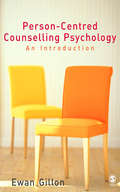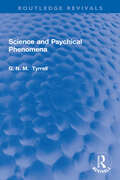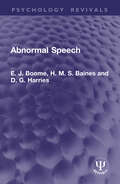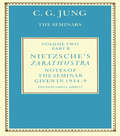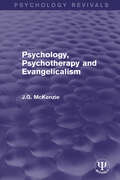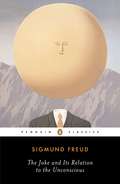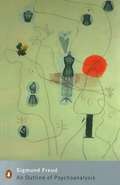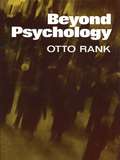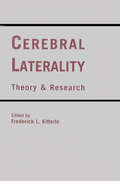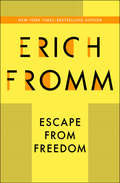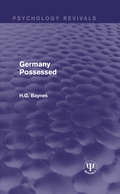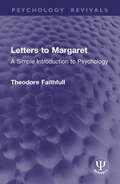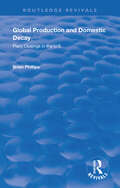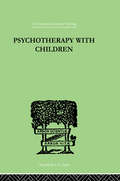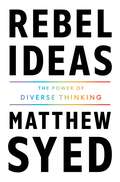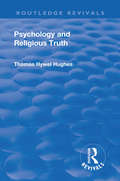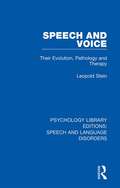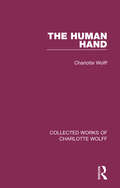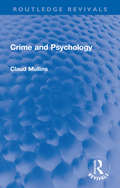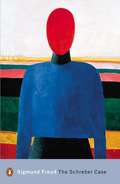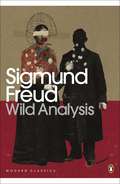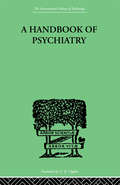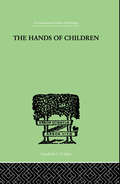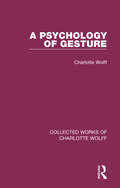- Table View
- List View
Man Against Himself
by Karl MenningerIn this landmark book, the impulse toward self-destructiveness is examined as a misdirection of the instinct for survival, a turning inward of the aggressive behavior developed for self-preservation.
Person-Centred Counselling Psychology: An Introduction (Counselling And Psychotherapy Ser.)
by Dr Ewan Gillon'Not only is this the first key text on person-centred counselling psychology, but one of the best introductions to the approach. Gillon combines an in-depth understanding of the person-centred field with a highly accessible writing style to produce a book that will be of enormous value to anyone wanting to practice person-centred therapy. Essential reading for trainee and practising counselling psychologists with an interest in the person-centred approach and highly recommended for counsellors and psychotherapists of all orientations' - Mick Cooper, Professor of Counselling, Counselling Unit, University of Strathclyde Person-Centred Counselling Psychology: An Introduction is an introduction to the philosophy, theory and practice of the person-centred approach. Focusing on the psychological underpinnings of the approach, Ewan Gillon describes the theory of personality on which it is based and the nature of the therapeutic which is characterised by o unconditional positive regard o empathy o congruence. The book shows how the person-centred approach relates to others within counselling psychology and to contemporary practices in mental health generally. It also gives guidance to readers on the approach's research tradition as well as considering key issues for those wishing to train and work as a person-centred practitioner. As such, it is designed to be an applied, accessible text, providing a dialogue between the psychological basis of person-centred therapy and its application within the real world. As well as psychology students, it will be of interest to those from other disciplines, counselling trainees, those within the caring professions, and person-centred therapists from a non-psychological background. Ewan Gillon is Director of The Edinburgh Psychology Centre and Lecturer in Counselling Psychology at Glasgow Caledonian University.
Science and Psychical Phenomena (Routledge Revivals)
by G. N. TyrrellFirst published in 1938, Science and Psychical Phenomena presents a comprehensive overview of diverse field of phenomena which is included under the heading of psychical research. Psychical research does not deal in Spiritualism or ‘Spooks’. It is the scientific investigation of the hidden faculties of Man, and it constitutes the main pathway to the understanding of the Human Individual. Since second half of nineteenth century, unknown to the general public, careful work with new methods has been going on, and the results when properly understood, are as startling as they are important. The present volume summarizes the work and discusses the far-reaching conclusion to which it points. This book is an important historical document for scholars and researchers of religion, psychology, philosophy of mind and psychic studies.
Abnormal Speech (Psychology Revivals)
by E. J. Boome H. M. Baines D. G. HarriesOriginally published in 1939, it was only recently that serious study and attention had been given to disorders of speech and there was a growing demand for books dealing with the subject. Abnormal Speech deals concisely with the aetiology of the varied abnormalities of speech and discusses the treatment practised by experienced therapists at the time, successful in affecting permanent cures. It was now recognised that the causes and classification of speech disorders were fairly numerous, and that the essence of treatment consisted of discovering the nature and cause to apply the appropriate method of treatment. It was revised in 1950 in some part to account for the effects of the second world war on speech disorders.Today it can be read in its historical context.This book is a re-issue originally published in 1939. The language used and views portrayed are a reflection of its era and no offence is meant by the Publishers to any reader by this re-publication.
Nietzsche's Zarathustra: Notes of the Seminar given in 1934-1939 by C.G. Jung (Bollingen Series (general) Ser. #600)
by C. G. JungFirst published in 1989. Routledge is an imprint of Taylor & Francis, an informa company.
Psychology, Psychotherapy and Evangelicalism (Psychology Revivals)
by J.G. McKenzieOriginally published in 1940, this is a contribution to the better understanding of Evangelical experience and doctrine. It is the author’s belief that the application of psychology to religion in general can make little or no further advance except through the study of particular types of religious experience. The various psychotherapeutic techniques provide the means for such a study, and in this volume they are applied to Evangelicalism. At first the author attempts to justify this application to Evangelical experience and doctrine, and outlines what he believes to be the essence of Evangelicalism. Part 2 of the book begins the contribution proper with an attempt to get a clear view of conscience and proceeds to salvation and its problems: conversion, guilt, sin, forgiveness, atonement. Part 3 deals with Evangelical experience and doctrine and the spiritual life of the Evangelical, and concludes with some general applications of psychology to Church work.
The Joke and Its Relation to the Unconscious
by Sigmund FreudWhy do we laugh? The answer, argued Freud in this groundbreaking study of humor, is that jokes, like dreams, satisfy our unconscious desires. The Joke and Its Relation to the Unconscious explains how jokes provide immense pleasure by releasing us from our inhibitions and allowing us to express sexual, aggressive, playful, or cynical instincts that would otherwise remain hidden. In elaborating this theory, Freud brings together a rich collection of puns, witticisms, one-liners, and anecdotes, which, as Freud shows, are a method of giving ourselves away. .
An Outline of Psychoanalysis (Penguin Modern Classics)
by Sigmund FreudOne of fifteen volumes in the new Freud series commissioned for Penguin by series editor Adam Phillips. Part of a plan to generate a new, non-specialist Freud for a wide readership, which goes way beyond the institutional/clinical market and presents material to the reader in a new way. This volume will contain NEW INTRODUCTORY LECTURES IN PSYCHOANALYSIS and AN OUTLINE OF PSYCHOANALYSIS.
Beyond Psychology
by Otto RankPsychologist, psychoanalyst, sociologist, teacher, Otto Rank (1884-1939) wrote on such subjects as the artist, myth, the hero, sexuality, guilt, dreams, neurosis, and the technique and history of psychoanalysis. His ideas stimulated new lines of investigation not only in psychology but also in social science, religion, history, and anthropology. A pupil, colleague, and early follower of Freud (and later one of his chief dissenters), Rank settled in America in 1933 for a "sabbatical leave" devoted to therapy and teaching. Beyond Psychology was his first book in English, and it contains the results of a lifetime of thought and research about man's essential nature.In Beyond Psychology Rank explores the ultimates of human existence -- the fear of death, the desire for immortality, the nature of sexuality, the basis of personality, the nature of social organization, the need for love, the meaning of creativity. He notes the failure of rational ideologies to cope with the instability in our social order, the lack of generally accepted ideals, the hostility, fear, and guilt that seem to characterize our civilization. Rank seeks to understand the basic human problems not by a rejection of irrationality but by an acceptance of it as an inevitable fact of human existence.After a detailed critique of rational psychologies, he examines the myth of The Double in legend and literature in order to investigate the development of the ideal of the Soul, and he traces the reflection of man's fear of final destruction in social organizations, ideologies, concepts of personality, sexual roles, and religion. Among the subjects investigated in this searching analysis are kingship and magic participation, the institution of marriage, power and the state, Messianism, the doctrine of rebirth, the two kinds of love (Agape and Eros), the creation of the sexual self, feminine psychology and masculine ideology, and psychology beyond the self.
Cerebral Laterality: Theory and Research
by Frederick L. KitterleResearch on clinical populations and studies of normal individuals support the conclusion that there are functional differences between the cerebral hemispheres. This book captures some of the major developments in the field of cerebral laterality research of the last five years. These include lateralization in non-human primates, computational models of hemispheric processing, hemispheric transfer and interaction, perceptual asymmetries, techniques to measure dynamic changes in hemispheric processing of information, and new conceptualizations of the relation between handedness and cerebral laterality. The topics discussed exhibit an interconnectedness such that the approaches and techniques used in one area of cerebral laterality research have implications for research in other disciplines. They also reflect changes in the conceptualization of general theoretical issues regarding cerebral laterality research.
Escape from Freedom: Escape From Freedom, To Have Or To Be?, And The Anatomy Of Human Destructiveness
by Erich FrommWhy do people choose authoritarianism over freedom? The classic study of the psychological appeal of fascism by a New York Times–bestselling author. The pursuit of freedom has indelibly marked Western culture since Renaissance humanism and Protestantism began the fight for individualism and self-determination. This freedom, however, can make people feel unmoored, and is often accompanied by feelings of isolation, fear, and the loss of self, all leading to a desire for authoritarianism, conformity, or destructiveness. It is not only the question of freedom that makes Fromm&’s debut book a timeless classic. In this examination of the roots of Nazism and fascism in Europe, Fromm also explains how economic and social constraints can also lead to authoritarianism. By the author of The Sane Society and The Anatomy of Human Destructiveness, this is a fascinating examination of the anxiety that underlies our darkest impulses, an enlightening volume perfect for readers of Eric Hoffer or Hannah Arendt. This ebook features an illustrated biography of Erich Fromm including rare images and never-before-seen documents from the author&’s estate.
Germany Possessed (Psychology Revivals)
by H.G. BaynesOriginally published in 1941, the blurb read: "The aim of this work is to state and understand the psychological dynamics of the present conflict. The author is a medical psychologist who has had unusual opportunities for studying German mentality. He characterizes the condition of Germany as one of dæmonic possession and Hitler as the primitive medicine-man who gained a magical ascendency by playing the role of medium to the German unconscious. He analyses the fundamental instability of the collective German psychology and relates this to the dæmonic outbreak. The ambiguous personality of the Führer is seen as the indispensable symbol of a deeply divided nation striving for unity. Whereas the pagan-Christian conflict in the soul of Christendom is urging individual consciousness to a new statement of human values, it has produced in the soul of Germany a state of collective intoxication which is the negation of individuality. This book is the first serious attempt to depict the invisible underground causes of the European catastrophe and to state the issue in terms of epochal transition. It was German violence which started the conflagration, but the fires of anti-Christian revolt have long been smouldering in the general unconscious. Material of a varied kind, gathered from German myth and legend and from a number of contemporary witnesses has been pieced together into a comprehensive psychological survey, embracing both the personal and the impersonal aspects of the German scene. Hitler is discussed as personality, as symbol, and as a disease. The influence of the Wagnerian German myth upon Hitler’s inflammable imagination is discussed and the basic ideas of Hitlerism are traced to their source. This is the attempt of psychology to elucidate the irrational and unintelligible elements in the present chaos."
Letters to Margaret: A Simple Introduction to Psychology (Psychology Revivals)
by Theodore FaithfullFirst published in 1941, the original blurb for Letters to Margaret reads: ‘In view of the almost universal ignorance of the most elementary biological and psychological facts of life amongst adults, and waste of time and energy amongst children in attempts to acquire surreptitiously the knowledge necessary to them, the author has supplied the need in this book. Drawing upon a fund of material accumulated over twenty years of work for difficult children, he gives in the form of letters to a girl on the threshold of adolescence answers to many questions which puzzle the eager minds of boys and girls. He traces the course of normal growth from birth to the age of twenty-five, and shows how the male and female elements combine to form the human personality. In a small compass he has given parents and teachers a book which will help children reach maturity ready to take an adult part in life. With this volume on their own shelves children will have no need to search the Bible for stray allusions to the act of reproduction, or borrow surreptitiously the volume on “advice to parents” supposedly kept beyond their reach.’ Today it can be read in its historical context.This book is a re-issue originally published in 1941. The language used and views portrayed are a reflection of its era and no offence is meant by the Publishers to any reader by this re-publication.
Global Production and Domestic Decay: Plant Closings in the U.S.
by Brian D. PhillipsFirst Published in 1942. Phillips has written an important study covering three areas: three areas: theoretical, empirical, and public policy. This book explores some of the explanations for and consequences of globalized production by transnational corporations. A review of the theoretical underpinnings of the reasons for corporate overseas expansion precedes a discussion of transnational corporation overseas production facilities. The literature reviewed supports the position that the exodus of manufacturing capital has been assisted by state policy which has encouraged capital flight, and that corporate efforts to downsize manufacturing operations in the United States have added to corporate profitability and championed profits over the strengthening the domestic economy.
Psychotherapy with Children
by Frederick H. AllenFirst published in 1999. Routledge is an imprint of Taylor & Francis, an informa company.
Rebel Ideas: The Power of Diverse Thinking
by Matthew SyedIdeas are everywhere, but those with the greatest problem-solving, business-transforming, and life-changing potential are often hard to identify. Even when we recognize good ideas, applying them to everyday obstacles—whether in the workplace, our homes, or our civic institutions—can seem insurmountable. According to Matthew Syed, it doesn't have to be this way. In Rebel Ideas, Syed argues that our brainpower as individuals isn't enough. To tackle problems from climate change to economic decline, we'll need to employ the power of "cognitive diversity." Drawing on psychology, genetics, and beyond, Syed uses real-world scenarios including the failings of the CIA before 9/11 and a communication disaster at the peak of Mount Everest to introduce us to the true power of thinking differently. Rebel Ideas will strengthen any kind of team, while including advice on how, as individuals, we can embrace the potential of an "outsider mind-set" as our greatest asset. Matthew Syed is the Sunday Times bestselling author of Black Box Thinking, Bounce, and The Greatest. He writes an award-winning newspaper column in The Times and is the host of the hugely successful BBC podcast Flintoff, Savage and the Ping Pong Guy.
Revival: Psychology And Religious Truth (1942) (Routledge Revivals)
by Thomas Hywel HughesAn attempt is made in this book to open a new line of thought in theology with the aid of Psychology. The author strives to throw light on the basic truths of religion from a new angle and to adopt a different attitude to that usually taken by theologians. He believes that there is still more light which psychology can throw regarding these truths, but its findings are not yet adequate nor sufficiently clear for this. Here the lectures cover the bearing of psychology on - The Origin of Religion; The Idea of God: Religious Life; Religious Truth and Belief; The Trinity; The Person of Christ; The Atonement; and The Future Life.
Speech and Voice: Their Evolution, Pathology and Therapy (Psychology Library Editions: Speech and Language Disorders)
by Leopold SteinOriginally published in 1942, this title was recognised as setting new standards in the scientific approach to speech problems. Much speech therapy in the past had been unsatisfactory because of its emphasis upon the purely mechanical aspects of the condition, while at the same time the purely psychological approach was not sufficient to lead to satisfactory and radical treatment either. In this title the author combines the two approaches and by setting out the basic pathology of the various conditions, he throws new light upon them. Today it can be read and enjoyed in its historical context.
The Human Hand (Collected Works of Charlotte Wolff #1)
by Charlotte WolffOriginally published in 1942, this book was very different from anything else written about the psychology of hands. The author had worked amongst apes and monkeys at the zoo, patients in what at the time were called ‘mental hospitals’, and amongst all manner of men, women and children. The results of her research are found here where she looks at how the hands link to the brain and ultimately our personality. A pioneer in this field the author continued her research in this area for a number of years. A fascinating glimpse into early personality psychology.
Crime and Psychology (Routledge Revivals)
by Claud MullinsFirst published in 1943 Crime and Psychology reveals to the public some of the results of well-known magistrate Claud Mullin’s many years of pioneering work in using the help of medical psychologists for the treatment of criminals. The book contains numerous actual cases of real scientific and social value. They show how even men who have in the past been sent to prison for serious offences can be helped, through treatment while at liberty, to lead useful lives for many years afterwards. The author also shows how psychological principles could become essential features of our system of criminal trial. This constructive and convincing book is an essential read for scholars and researchers of criminal psychology, applied psychology, criminology, and psychology in general.
The Schreber Case (Penguin Modern Classics)
by Sigmund FreudThe Schreber Case is distinctive from the other case histories in that it's based on the memoirs of a conjectural patient. Schreber was a judge and doctor of law who lived according to a strict set of principles. His nervous illness first manifested itself as hypochondria and insomnia - which he put down to his excessive workload - but gradually deteriorated into pathological delusion. Believing himself to be dead and rotting, Schreber attempted suicide, and then went on to experience bizarre delusional epsiodes whereby he belived he was being turned into a woman. The course of this extraordinary illness is analysed by Freud in his search for a root cause - could it have been caused by homesexual impulses that Schreber tried to repress?
Wild Analysis (Penguin Modern Classics)
by Sigmund Freud'Psychoanalytic treatment utilised the patient's capacity to love and desire as a means to an end. The stuff of romance became the stuff of cure. When Freud is writing about technique in psychoanalysis - and these papers [in Wild Analysis] represent his most significant contributions to the subject over three decades of work - it is important to remember that he is talking about what a couple, an analyst and a so-called patient, can do in a room together. For better or worse.' Adam Phillips
A Handbook Of Psychiatry (International Library Of Psychology)
by P.M. Lichtenstein S.M SmallThis is Volume XI of nineteen in collection of Abnormal and Clinical Psychology. Originally published in 1944, this book looks at the area of normality and abnormality. Normalcy is a relative term and its patterns vary continuously.
The Hands Of Children: AN INTRODUCTION TO PSYCHO-CHIROLOGY (International Library Of Psychology Ser.)
by Julius SpierThis is Volume XVIII in a series of twenty-one in a collection on Individual Differences. Originally published in 1931, this posthumously published work provides the reader with an introduction to psych-chirology with additions by the current editor's experiments and anaylsis. With an Appendix on the Hands of the Mentally Diseased by Herta Levi.
A Psychology of Gesture (Collected Works of Charlotte Wolff #2)
by Charlotte WolffOriginally published in 1945, this title was a follow-up to the author’s previous book The Human Hand. This time she looks at the psychology of gesture and its relation to personality. The special place that a psychology of gesture merits is obvious. It permits a direct knowledge of personality without any effort or misleading co-operation on the part of the subject, since it can be applied without his being aware of the fact. The book ‘is constructed on a system of clinical studies and medico-psychological interpretations.’ The author felt that this title must be regarded as a complementary study to her main studies.

